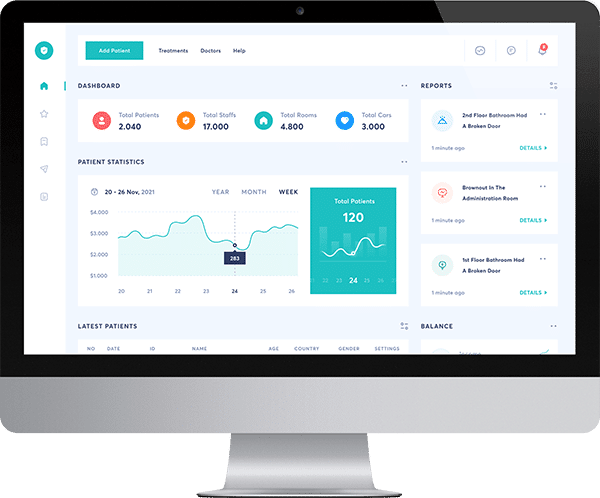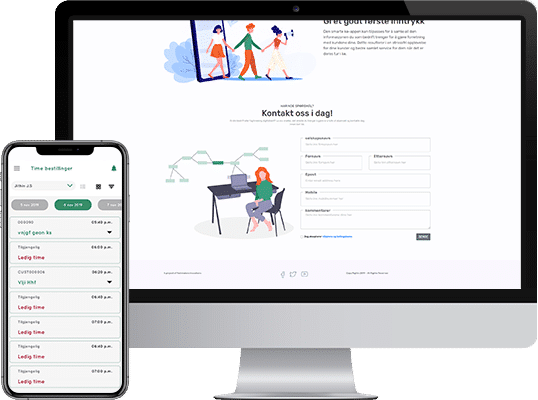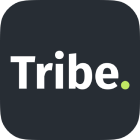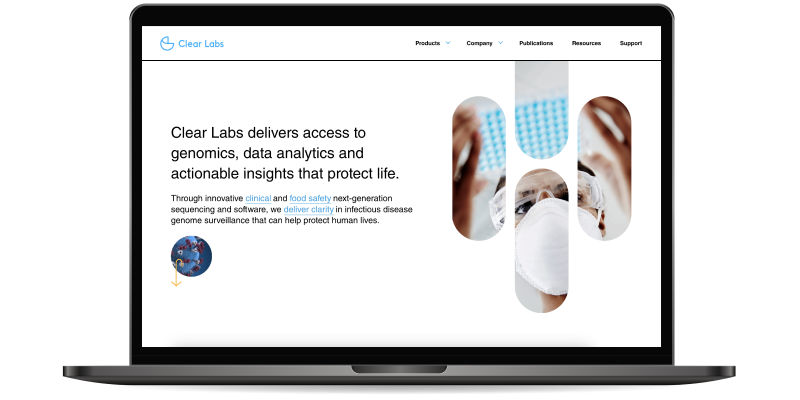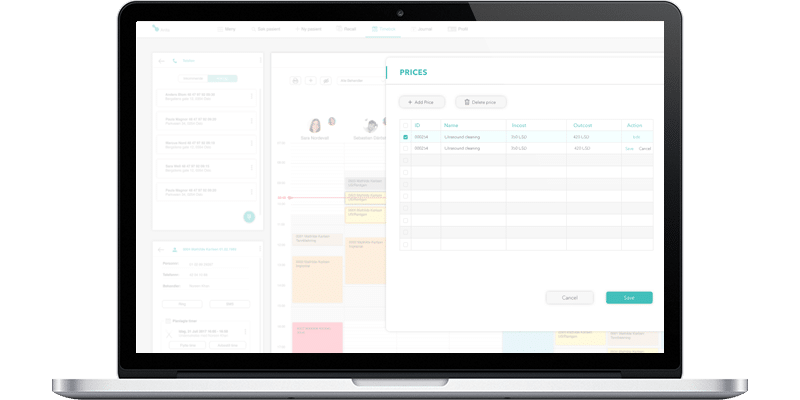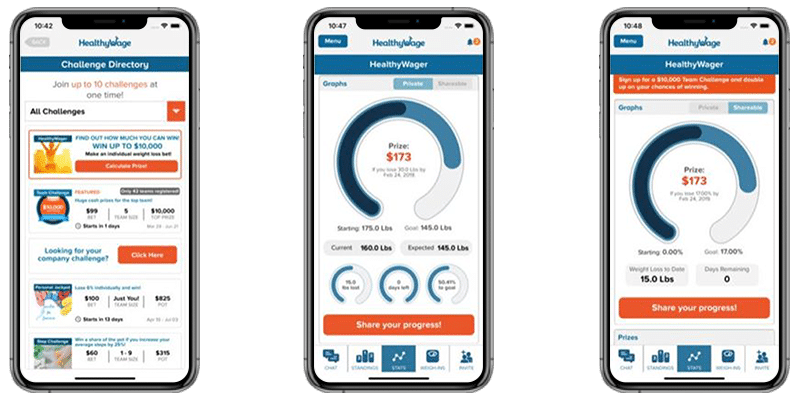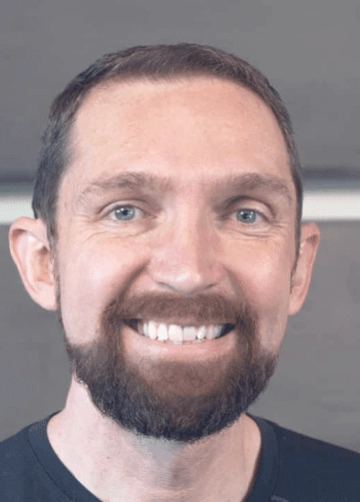Modern multi-specialty healthcare organizations that aim to provide top-notch services can’t rely on disparate collections of IT products in their hospital workflows. The only opportunity for them to guarantee excellent patient outcomes and stay ahead of the technological curve is to onboard comprehensive hospital management systems. These all-embracing solutions enable healthcare professionals to streamline and facilitate a broad range of shop floor activities and healthcare operations within a clinic, from scheduling patient appointments to inventory management.
What we offer
Our best-in-class hospital management system development services empower medical facilities to manage, track, and optimize administrative and financial processes, data management pipeline, and other hospital operations by leveraging the robust capabilities we build.
Hospital and clinic information (HIS/CIS)
Hospital/clinic information systems can be developed with a modular structure to collect and process various data from different departments. HIS acts as an integrator capable of facilitating hospital operations management. HIS covers two datasets: patient care information and hospital staff management information. Patient treatment, hospital facilities, administrative issues, customer support, and human resources all run under the strategic management provided by HIS. Hospital information systems provide the most comprehensive outlook of hospital activities enhanced by digital technologies.
Electronic records (EHR/EMR)
Electronic health records have long become a must-have element of modern healthcare practice. EHR is as indispensable for hospitals as CRM is for any commercial project today. Healthcare organizations use EHR to collect and store patient information, starting from patient demographics and ending up with their medical history. EHR can be created as a standalone software product or an integral part of a more comprehensive hospital management system. EHR can include individual modules for patients through which they can perform many treatment-related activities such as paying for healthcare services, checking recovery progress, and finding medication prescriptions. EMR (electronic medical records) is a subtype of EHR dedicated to the narrower specific data such as dosage, procedures, bedside notes, etc.
Practice management (PMS)
Practice management software is another type of healthcare-related program we develop. PMS can be designed individually to meet the specific needs of a particular medical institution. As a highly customized sort of medical software, PMS can include such modules as e-prescribing sections, telemedicine features, automated scheduling, remote treatment support, and many more. Medical practices may vary very much, but our engineers are experienced enough to be agile in meeting the individual needs of different healthcare organizations. We create custom PMS to assist doctors and hospitals in making their specific practices easily manageable with user-friendly software products.
System architecture and integration
We support modular architectures when software is designed to be either an integral part of a more comprehensive program or a standalone software product. We never seek to monopolize the entire infrastructure of our customers. On the contrary, our deep expertise in healthcare software development allows our engineers to create easily integrable modules for already existing systems. Neither the scope nor complexity can prevent our developers from building fully-fledged software architectures for all types of healthcare organizations. Our wide previous experience in healthcare software development makes us equally confident in creating, for example, a new embeddable payment gateway for an existing HIS as well as in building holistic all-in-one ecosystems for clinics and hospitals.
Hospital case management software
This is the centerpiece of a patient-centric model harnessed by the healthcare sector. It covers the entire patient experience within a healthcare facility, including online appointment scheduling, incoming patient registration, assigning rooms and beds, monitoring diagnosing and treatment outcomes, tracking billing, insurance, and payments, and more. The operational efficiency of such hospital management solutions is ensured via their integration with a comprehensive profile-based system of patient records storage operated through a custom interface registry. This user-friendly dashboard allows healthcare providers to enhance patient care thanks to its ability to manage and coordinate hospital admissions, discharges, and readmissions, control treatment plan efficiency, and improve department transfer.
Healthcare reporting software
With this type of hospital management software solution in place, you can address all the informational needs of your hospital without the help of a professional analyst or comprehensive training programs to teach personnel how to handle them. Integrated into your hospital systems, they enable visual data analysis and streamline building reports that are refreshable in real-time. They contain critical efficiency parameters such as patient satisfaction, bed occupancy, staff per patient, cost per patient, etc. With such clinical data insights, you can identify hospital performance bottlenecks, efficiently manage hospital processes and healthcare costs, and provide high-quality patient care.
Let’s discuss your requirements to a hospital management system.
Send your requirements and we’ll get back soon to you.
Essential features of hospital management software
As vetted hospital management software developers, we at DICEUS know what modules such healthcare solutions should include.
Electronic medical records (EMR) management
EMR is the modern IT-powered healthcare industry’s backbone, serving as a consolidated healthcare data hub. Integrating it with other healthcare systems leveraged by hospitals in their pipeline activities, medical personnel obtain a 360-degree view of patients via having access to their medical histories, visits, doctor’s notes, test results, medication prescriptions, vaccines, etc.
Laboratory management
It allows clinics to standardize testing workflows. Using this capability, you can quickly enter patient data and test results, perform sample tracking, control reagents and lots, monitor validation of results, and generate transparent reports. Thus, the obtained test data is collected, sorted, categorized, and amplified with additional patient information, if necessary.
Patient management
When synchronized with patient portals and EMR, this capability paves the way for efficient visit scheduling, patient onboarding and discharge tracking, and automating communication between doctors and patients. Moreover, the system sends reminders, alerts, and follow-ups to improve patient engagement and augment patient safety. You can reinforce this feature with an out-patient management module that will assist in planning regular home visits and performing remote counseling.
Inventory management software
For any healthcare facility, the sufficient level of medical supplies to meet patient demand is a life-and-death issue. This module allows administrative staff to keep track of hospital resources, manage orders, streamline medication prescriptions, predict purchases, and optimize resource allocation, making sure you never run out of medical stocks.
Financial management
Modern clinics are complex business enterprises whose financial health depends on many factors. Equipping your healthcare management software with this capability will dramatically facilitate your revenue management, billing, expense tracking, budget planning, and other money-related workflows. Patient payments can be effectively managed via hospital contract management software that often comes as a part of financial management solutions.
Insurance management
It is called to enhance health insurance portability. When healthcare providers can quickly retrieve a patient’s policy number, policy information, insurance company, and other important insurance details, the process of filing and processing claims is significantly accelerated. As a result, insurance eligibility verification is performed within seconds, the patient’s insurance coverage is confirmed as fast, and reimbursements are obtained without delay.
Data analytics and reporting
This module relies on AI-driven models to process huge amounts of patient, medical, and hospital data. Such a power allows it to assess personnel efficiency, identify performance gaps, and provide meaningful insight for decision-makers who can utilize them for strategic planning and project management. Reports that the system generates are presented in an easy-to-understand format with a reliance on data visualization techniques.
Nurse station
Efficient nurse performance is vital for high-quality medical care delivery. This capability is honed for assisting nurses in their daily routines, enabling them to improve patient monitoring and assessment, shift planning, drug access controls, document handling, and more.
Hospital mobile apps
The ubiquity of smartphones has made the mobile experience of both patients and healthcare employees a must. By launching a user-friendly mobile app and turning it into a staple of a hospital’s life cycle, medical facilities increase their audience, step up their interaction with patients, and improve treatment efficiency.
Benefits of our hospital management software development services
Our hospital management system development process
About DICEUS
Why choose DICEUS for hospital management software development
The contemporary outsourcing market is full of vendors offering their IT services to organizations across the globe. What makes us sure DICEUS is the best choice for creating hospital management solutions?
- Long presence in the niche. We have provided outsourced high-tech development services for more than 13 years, during which our specialists accumulated vast knowledge and numerous hands-on skills related to handling projects in the realm of healthcare.
- We have 250+ full-time experts onboard. Our qualified and certified developers, who constantly improve their competencies, can tackle the end-to-end creation of hospital management software—from the discovery phase and planning to UI/UX design, coding, testing, and deployment.
- Compliant solutions. Healthcare IT products have stringent compliance requirements concerning data security. The hospital management products we build adhere to HIPAA, GDPR, CCPA, and other industry regulations.
- Client-centered approach. We meet our partners halfway concerning various aspects of our cooperation, adapting to their communication style and interaction schedules no matter how significant the time zone difference may be.
Get professional consulting on your project!
What impacts your project duration
The timeframe of every particular project is individual, especially when it comes to healthcare software. Many critical factors should be considered to define a more or less exact duration of the entire development process. In any case, our specialists will do their best to deliver your healthcare software in the shortest possible period without compromising the quality. The following factors can impact your project duration, among other things:
- Project requirements
- Expected deadlines
- Team composition
- Chosen technology and platforms
What affects your project costs
In general, the number of working hours of various specialists engaged in the healthcare software development process determines the cost of a finished product since an hourly rate is the most typical job evaluation method in software development. Hence, the final cost of your project will depend on the time we have to spend to complete your project from A to Z. The following factors can determine your project’s budget:
- Project scope and complexity
- Chosen technology
- Project completion urgency
- Engagement model: Time and Material, Dedicated Team
What we need from your side
It is rare to get a clear SDS (software design specification) from a customer: quite specific data should be indicated there. That’s why we always propose to arrange an online meeting during which our engineers and project managers can ask customers about all the nuances they should know regarding the healthcare software product to be developed. Please provide us with this info to simplify our task:
- Project goals, vision, and roadmap, if exist
- High-level project requirements
- Project-specific documentation, if available
- Client’s availability for weekly gathering sessions
Which organizations gain from developing custom hospital management software
When developed and implemented by a qualified vendor, hospital management systems bring positive changes to various workflows of multiple agents in the healthcare market.
Our tech stack
Explore our case studies
Testimonials
Frequently asked questions
Can you prove your hospital management software expertise?
Seeing is believing, right? Please visit the healthcare software section of our portfolio to check the healthcare software solutions we have already created. There, you can find brief descriptions of the projects covering both the challenges we have faced and the solutions we have developed. All of the use cases include no virtual prototypes, and only those healthcare software products that have been launched successfully are shown. You can also find our customers’ feedback there.
How do you differ from the others in terms of healthcare software?
There are two types of software development companies: highly specialized ones that create a specific type of software only and multi-service companies that take whatever order is available. The first ones are usually limited by quite a narrow set of approaches and technologies they consider the most relevant to their sector. The second ones can rarely achieve profound expertise in healthcare software development due to their omnivorous business strategy in contrast to both types. We know exactly what functionality healthcare software requires, while our rich healthcare software development expertise shows us multiple ways to achieve functionality.
Do you provide IT consulting and software architecture services?
Both IT consulting and software architecture services are essential elements of our activity. We always seek to share our knowledge with anyone who needs it. All our specialists are sincere advocates of the broadest possible IT literacy. We consult our customers “on the go” for free when they participate in the development process. Standalone IT consulting and software architecture services are also available even if no software product is ordered to develop.
